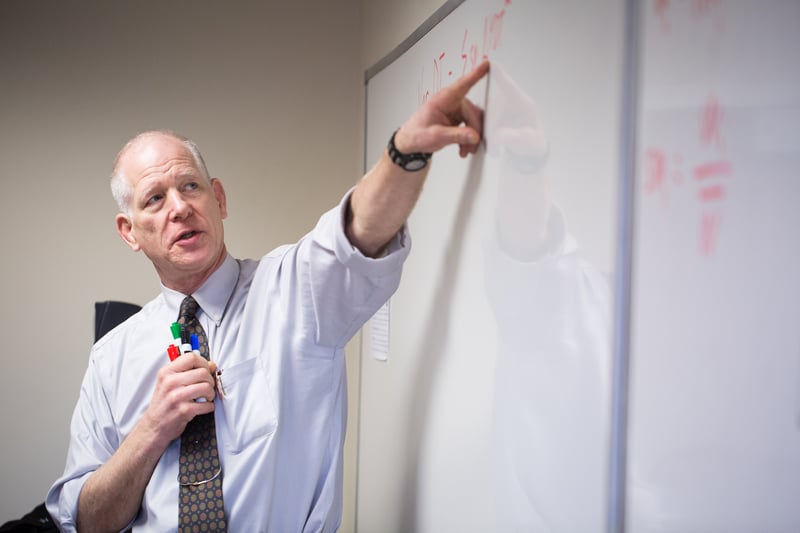
Physics class commenced with a rather unorthodox lecture this semester—one that required none of the usual calculators and equations. Instead, Dr. Michael Kucks, Director of the Economics & Business Analytics Program and Associate Professor of Mathematics and Physics at Patrick Henry College, outlined a new, informal personality profile based on five distinctions he believes are inherent in the way humans work.
Knowing these variances is crucial for navigating any relationship, Dr. Kucks explained, but they’re especially important in the classroom where conflicting personalities are forced to collaborate. “The important thing is to make sure my students are aware of their styles of learning and my style of teaching," he added, "It gives context to the classroom,"
So here’s the list; see where you stand. And remember, like Dr. Kucks said, “The most useful are the ones that make sense to you.”
1. Think to Talk vs. Talk to Think
In other words, do you anticipate exactly what you’re going to say before you say it or does it feel better to speak your mind first and then allow the conversation to clarify your thoughts? Think to talk-ers usually find themselves talking through all the possibilities aloud in order to better understand their viewpoint.
In the classroom: Internal processors often feel uncomfortable when someone asks them to respond ideas instantly without time to formulate their ideas. External processors, on the other hand, feel right at home there.

Think to talk study help: Take some solo-time and outline your thoughts, beginning with the most broad, overarching themes and ending with the most specific, concrete details possible. It'll show you the flow of ideas according to you and in an ordered fashion.
Talk to think study help: Study groups are your friend. Hearing a variety of perspectives will help you form your own so you can better prepare for your next exam!
2. Sequential Thinking vs. Random Access
Do you capture ideas by working through them logically, from point to point, or is it easier to jump around in an erratic fashion until it all makes sense?
 In the classroom: If you’re a sequential thinker, you are more comfortable with systematic explanations of how things work. Detailed outlines and sub-points make sense to you. Random access thinkers work better with big picture ideas and moving parts.
In the classroom: If you’re a sequential thinker, you are more comfortable with systematic explanations of how things work. Detailed outlines and sub-points make sense to you. Random access thinkers work better with big picture ideas and moving parts.
Sequential thinking study help: Take notes the Cornell way!
Random access study help: Take notes with colored pens to identify different ideas.
3. Past, Present, Future
Which one do you think about the most? Past-focused individuals tend to dwell on the bygone years. Perhaps these are the history majors or, if not, the nostalgic ones who enjoy reminiscing and about the good old days. They ask questions like, “In what ways can my life shift to accommodate the successes and/or errors of the past?”

Present-minded people relish the things directly before them. They are often keenly aware of the wealth of relationships and opportunities available at any given moment and have a unique ability to focus on today without worrying too much about whatever ramifications that may come tomorrow.
Future-minded individuals are somewhat more analytical and calculated than their counterparts. They measure their decisions based on how things would hypothetically play out down the road, rather than simply what may feel right in the moment.
In the classroom: You probably care about the subject in proportion to how it will help you A) understand the past B) navigate the present or C) prepare for the future.
4. Poet vs. Engineer
Creative or mechanical? Poets tend to be the romantics, the visionaries, the writers, and the artists. Engineers and the rational, calculating ones, the "numbers people," the doctors, lawyers, and scientists.
In the classroom: Does the subject have a good story? That’s for you, poets. If it doesn’t – if it’s set up like a logic or numbers game—let the engineers handle it.

Poet study help: Be sure to take real time away from school to reboot your creative juices and get back in tune with who you are, what you believe, and why it's important. It might not be easy to take time away from other pressing things but you'll be so glad you did.
Engineer study help: Give yourself the space and time to mentally tinker until the major ideas in class make good sense to you. Break them down, examine their parts and put it in a framework that your brain can really work with.
Dr. Kucks explains personalities like granite layers in the earth: “We have a strong foundation, that’s the granite and that’s our nature. Of course, granite has dirt layered on top. But its only, say, 20 feet deep. That’s the layer where you grow and change and adjust.”
His advice for students trying to work with other personalities? Know when you’re hitting granite and be respectful of it—don’t use dynamite.
--------------------


